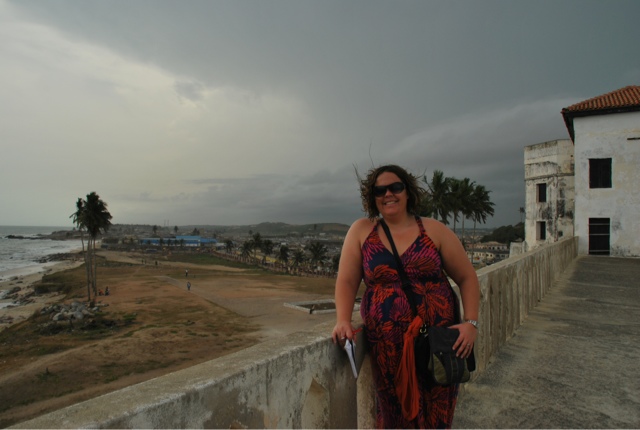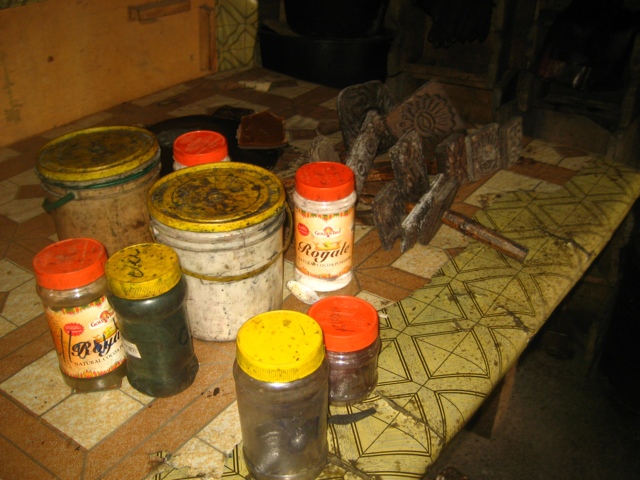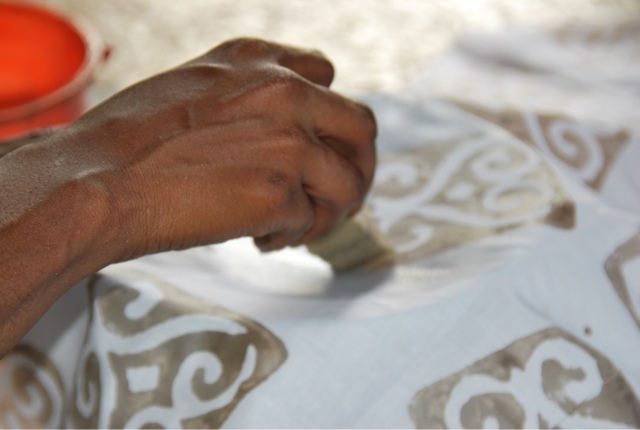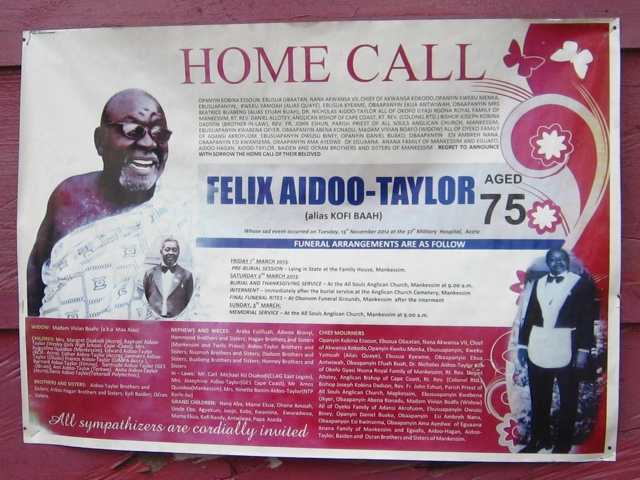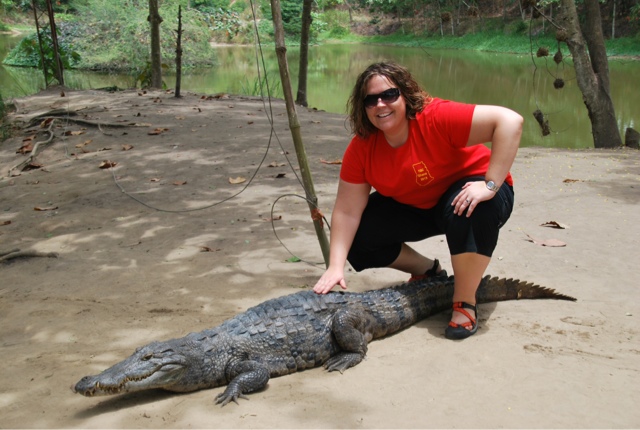It is hard to say goodbye to Ghana......I feel like I have left a part of myself years ago, and again this time with my TGC (Teachers of Global Classrooms) experience. Throughout my weeks in Ghana, I was focusing on how the country has progressed in terms of healthcare since I lived there 9 years ago. I feel like I left with more questions on healthcare than when I arrived!
Ghana has changed over the years for the better. They are progressing. I was of course hoping to see that they would have changed much more, but I am impressed with what I did notice. Last time I was in Ghana, there were billboards, bumper stickers, posters- everything advertising safe sex and HIV/AIDS awareness. This time in Ghana, I noticed that I didn't see much of that at all. I did make it to several cities and regions of the country during my time, and I think I only saw a total of 3 signs about HIV/AIDS. We met with some education leaders in Ghana to find out that the rate of HIV/AIDS in Ghana is the lowest in all of Africa! What an improvement!!! I was amazed at what Ghana has done to educate their people about HIV/AIDS in the last decade. What a difference education can make!!
Another big change is their money- they have changed their currency since I have been there. They now have coins called "pace-ways" (not spelled right, that is just how it is said). They also have different bill denominations. In the past, 10,000 Cedis (Cedi is the name of their currency) was equal to $1 USD. They have changed their money to make it easier (in my eyes that is!) so that now 2 cedis is equal to $1 USD. It makes things much easier! (see picture of cedis below)
All in all, I had a wonderful experience in Ghana. I am blessed to have had the opportunity to return to such a great country full of riches in resources and people. Everyone in Ghana is so friendly and welcoming, even to me- the "obruni." "Obruni" is a term used for white person, and it is not derogatory, but more of a friendly term. I really am lucky to have been chosen for the fellowship from the State Dept. for this amazing experience. I have developed great friendships and working relationships with colleagues around the United States and Ghana. Now....time to head home!!
I will be reporting my experiences abroad as well as opportunities offered for both teachers and students to travel the world. “This blog is not an official U.S. Department of State blog. The views and information presented are the grantee's own and do not represent the Teachers for Global Classrooms Program, IREX, or the U.S. Department of State.”
Saturday, March 30, 2013
Farewell Dinner & Malaria
It was our last night in Cape Coast, and the headmistress (principal) invited us over to her house for dinner (keep in mind teachers at Wesley Girls School live on campus). One thing that is hard for Americans to understand is what is known as "African Time." For example, our dinner was at 6:00PM, but we didn't arrive until 6:45, and we were considered to be "early." The power was out, which is something that happens frequently in Ghana. In order to preserve power, they shut off certain sections of town for undefined amounts of time. During our 2 hour visit and dinner, we ate by candle lite as the power never came back on. During this time, all of the students were studying by flashlight in their rooms- WOW! As you can tell from my blog posts, students here in Ghana (and families too!) truly value education!!!
I felt awful at the dinner because the headmistress had malaria! If I were her, I would have canceled the dinner and stayed in bed....but not her! This is something that is very common in Ghana, and all over Africa for that matter. Malaria is the #1 killer in all of Africa, and is spread through mosquitos. All of the girls at school are required to sleep in mosquito nets so they can prevent bites during the night. Malaria is not contagious as it is only spread via mosquitos. In order to prevent getting malaria, I had to take a pill once a week, but some people are on a different type in which you take daily. Once I am home, I have to continue to take my malaria medication for a month after my return. Even with taking the medicines, it still does not ensure me that I will completely stay away from malaria, it just reduces my chances of contracting it. Last year at Wesley Girls School, students stopped sleeping in their mosquito nets because it was too hot (no breeze). Over 200 girls at one time had malaria, and it affected their studies. It is now required to sleep in a mosquito net. I did not sleep in a net this time in Ghana, but when I lived there years ago I did. Malaria is very common, and some people get it multiple times a year. It involves a high fever as well as other signs similar to the flu. I hope I never get malaria!!! As a Michigander, I am so blessed to not have to worry about such things. I don't have to take medicine every week for any kind of bug bite nor do I have to worry about malaria- we are lucky!!!
At the dinner, we enjoyed conversations with the headmistress and staff to conclude our time at Wesley Girls School. Overall, the strike really had a direct impact on my experience since we didn't get much time in the classroom. Meredith and I made the best of our experience with our host teacher Ralph leading us around the cultural sites to fill the time. Ralph and his family presented us with gifts and so did the headmistress. I was overwhelmed :) My time in Ghana was awesome, and I am so thankful for the opportunity to return after having student taught there 9 years ago.
I felt awful at the dinner because the headmistress had malaria! If I were her, I would have canceled the dinner and stayed in bed....but not her! This is something that is very common in Ghana, and all over Africa for that matter. Malaria is the #1 killer in all of Africa, and is spread through mosquitos. All of the girls at school are required to sleep in mosquito nets so they can prevent bites during the night. Malaria is not contagious as it is only spread via mosquitos. In order to prevent getting malaria, I had to take a pill once a week, but some people are on a different type in which you take daily. Once I am home, I have to continue to take my malaria medication for a month after my return. Even with taking the medicines, it still does not ensure me that I will completely stay away from malaria, it just reduces my chances of contracting it. Last year at Wesley Girls School, students stopped sleeping in their mosquito nets because it was too hot (no breeze). Over 200 girls at one time had malaria, and it affected their studies. It is now required to sleep in a mosquito net. I did not sleep in a net this time in Ghana, but when I lived there years ago I did. Malaria is very common, and some people get it multiple times a year. It involves a high fever as well as other signs similar to the flu. I hope I never get malaria!!! As a Michigander, I am so blessed to not have to worry about such things. I don't have to take medicine every week for any kind of bug bite nor do I have to worry about malaria- we are lucky!!!
At the dinner, we enjoyed conversations with the headmistress and staff to conclude our time at Wesley Girls School. Overall, the strike really had a direct impact on my experience since we didn't get much time in the classroom. Meredith and I made the best of our experience with our host teacher Ralph leading us around the cultural sites to fill the time. Ralph and his family presented us with gifts and so did the headmistress. I was overwhelmed :) My time in Ghana was awesome, and I am so thankful for the opportunity to return after having student taught there 9 years ago.
Thursday, March 28, 2013
Until the Lion Has His Historian, the Hunter Will Always Be a Hero......
Elmina Castle is located in Elmina, Ghana and is just a short drive from where I am staying in Cape Coast. Elmina is the largest of the 3 castles in Ghana that were used for the Trans-Atlantic Slave Trade. It was built as a Christian castle by the Portuguese in 1782, and then was later taken over by the Dutch and then finally the British. Today, Elmina castle is over 530 years old. The slave trade at Elmina ended in 1680 due to the start of the Industrial Revolution. Slaves came from all over Africa to be traded for gold, spices, food, ivory, brassware, guns, liquor, artifacts and other goods. Over 60 million slaves were said to be a part of the trade. 20 million of them died in the dungeons of the castle, 20 million died on the way to the New World, and 20 million survived. That means that only about 1/3 of the slaves survived. When the slaves died in the dungeons, they were thrown into the sea.
Women and men were kept in separate dungeons, and if there was a family, they were sold into slavery as a family. The governor had the top floor of the castle, and he would look down and choose his woman of the night to rape and torture. If a woman refused rape, she was chained to the ball (picture below) in the courtyard without food or water until she died. The living conditions of the slaves were exactly that of the Cape Coast castle (see previous blog entry).
It is our duty to educate ourselves of these injustices and ensure that they never happen again. As I was leaving the castle, I saw this quote, "Until the lion has his historian, the hunter will always be a hero." What does this mean to you?
Women and men were kept in separate dungeons, and if there was a family, they were sold into slavery as a family. The governor had the top floor of the castle, and he would look down and choose his woman of the night to rape and torture. If a woman refused rape, she was chained to the ball (picture below) in the courtyard without food or water until she died. The living conditions of the slaves were exactly that of the Cape Coast castle (see previous blog entry).
It is our duty to educate ourselves of these injustices and ensure that they never happen again. As I was leaving the castle, I saw this quote, "Until the lion has his historian, the hunter will always be a hero." What does this mean to you?
Making Batik- an Important African Craft
We had the opportunity to learn how to make the African craft of Batik. This is the process of putting hot wax on a stamp onto a cloth and creating a design. Then after finishing the stamping (which took forever!), we died the cloth and then hung it to dry. Since blue is my favorite color, I wanted my very own batik in something that I would use- a tablecloth. After it was hung, I could see how neat the design turned out as it interacted with the color. Then we had to swirl it up in a boiling pot of water over a fire to melt the wax off. Afterwards, it hung to dry. I have always wanted to see this craft in action, and I am very glad we were invited in to see for ourselves and actually make our very own batik!!!
Here, batik is used for making clothes, table cloths, bags, purses, pretty much anything!!!
Here, batik is used for making clothes, table cloths, bags, purses, pretty much anything!!!
Funerals in Ghana
Funerals in Ghana are completely different than funerals in America. First off, here when someone passes away, you make a big poster and get several prints to hang around town to let people know that a family member has passed away. My host teacher, Ralph, explained the process to us. Below is the poster he made for when his father passed away this past November. The funeral service was not until March. This happened for a couple of reasons: 1- to get the word out, 2- the election for President was happening, and 3- funding. A funeral in Ghana can last up to a week, as there are many parties. Most funerals are sort of like weddings- a lot of people come and there is drinking and dancing along with meals. Since these parties are so big, they cost a lot of money. In Ghana most people spend more money on their funerals than on their entire education!!!
Tuesday, March 26, 2013
Nzulezo Village on Stilts
Since the teachers are still on strike, I haven't spent much time at school. My host Ralph teaches at Wesley Girls Secondary School, and he has had free time with us this week since we are not teaching. We are doing as much as possible to get into schools and work with students, but it is hard due to the fact that they are on strike, students are taking national exams, and then students leave early for the Easter holiday.
Ralph had told us of a village on stilts a few hours away, so we decided to drive there for the day. We left at 7am, and returned around 11pm- it was surely an adventure!!! We met up with two other fellows in Takoradi, a city about an hour from Cape Coast. From there we followed each other until arriving at the place to take the canoe ride out to see the city on stilts.
To get to the canoes we had to walk barefoot through the mud and wetlands since it was too wet for a car to go through. Our driver named "PK" was amazing, and actually drove us through part of it.
Once we walked through the mud, there was a dock that took us to the entrance of the lake where we got in canoes and paddled for an hour to get to the village on stilts. Everything was made of wood, and the Nzulezo people have been living there for centuries. In the water along the way there were snakes and crocodiles, which was a bit scary considering we were only in a canoe.
We arrived at the village and got to speak with the chief's daughter since the chief was out of town. Here we learned that there were 450 people living in the village, and that the village just got electricity 9 months ago. While there, we toured the primary school and we walked through the rest of the town. The Nzulezo people are very friendly and opened their village to our visit.
Ralph had told us of a village on stilts a few hours away, so we decided to drive there for the day. We left at 7am, and returned around 11pm- it was surely an adventure!!! We met up with two other fellows in Takoradi, a city about an hour from Cape Coast. From there we followed each other until arriving at the place to take the canoe ride out to see the city on stilts.
To get to the canoes we had to walk barefoot through the mud and wetlands since it was too wet for a car to go through. Our driver named "PK" was amazing, and actually drove us through part of it.
Once we walked through the mud, there was a dock that took us to the entrance of the lake where we got in canoes and paddled for an hour to get to the village on stilts. Everything was made of wood, and the Nzulezo people have been living there for centuries. In the water along the way there were snakes and crocodiles, which was a bit scary considering we were only in a canoe.
We arrived at the village and got to speak with the chief's daughter since the chief was out of town. Here we learned that there were 450 people living in the village, and that the village just got electricity 9 months ago. While there, we toured the primary school and we walked through the rest of the town. The Nzulezo people are very friendly and opened their village to our visit.
Monday, March 25, 2013
Through the Door of No Return...
We were able to step through the "Door of No Return" to see what it felt like. Now on the other side is a lively fishing industry. It is important as people that we learn from our mistakes and not let things happen again, and that is why it is essential that we understand and empathize with the history of West Africa. I can't imagine my ancestors going through something of this magnitude and not walking around with a chip on my shoulder for what they had experienced. Racism is still rampant through the world today, and we need to put a stop to it. We are all people regardless of skin color, gender, religion.....
The Door of No Return
I was sickened by the stories of our tour guide today about Cape Coast Castle. We are all human beings regardless of our skin color or gender, and I honestly felt disgusted as I listened to the stories and history of what people went through during the slave trade. The generals came down to the women's dungeon and picked out a pretty one. He would then have her washed and sexually abuse her before she was allowed to go back to the dungeon. Over 60% of the people that ever entered the castle doors to be sold into slavery died waiting for the ships to take them to the new world. If they made it to the "door of no return," that meant they were boarding a ship for the Americas to be used as slaves. When the slaves boarded the boat they were in groups of 2 bound in shackles. The slave owners would brand his initials in the slaves so they would know which slave belonged to which owner. Often times the slaves would jump off into the ocean to drown as they would have rather died that lived the rest of their lives as slaves.
Dungeons of Cape Coast Castle
The men were separated from the women and "lived" in the dungeons of the castle. In these dungeons, there were no lights, food, water, etc. They lived and slept in their own feces and vomit. The only time their waste would be taken away was when it rained, the rain water would come through and wash some of it away. On the walls they had a chalk line drawn to the height of where the feces was, about 3 feet. I can't imagine sleeping in my own poop and vomit. How were these people not sick? The conditions were horrendous to say the least.
Africans Sold to Slavery in Return for Goods
Since there were no exact records kept, anywhere between 12 and 25 million Africans were sold into slavery and sent to the "New World." Here are the castle it was survival of the fittest. About 1/3 of these slaves came to what is now known as America. From here they worked on plantations and did various jobs for their slave owners. Often times slaves were traded for goods such as gold, food, money, land, etc.
Cape Coast Castle
The Trans-Atlantic Slave trade started in the 1500's with 13 castles and 17 forts in Ghana. People were sold into slavery and awaited their ships here in the castle.
Saturday, March 23, 2013
Kakum National Rainforest Park
Happy weekend everyone!!! Today was an adventure, as is everyday here in Ghana. We drove just outside the city of Cape Coast to visit Kakum National Park to walk through the rainforest. There you can climb up to the top and walk along the canopy- the top layer of the rainforest. There were 7 bridges that you could walk on, and it was SUPER high up off the ground. We were hoping to see some animals, but we just saw some birds. Meredith and I had a great time, and we even ran into people we knew- small world, right? Two other teachers who we are on the program with in another city were also there, and we ran into them while walking through the rainforest! Crazy!
After the canopy tour, we went to the Hans Cottage Botel where we had lunch. There we were able to feed the crocodile and even get close enough to pet it. It was very strange, as the woman working there just had a small stick. I asked her if that would protect us from the crocodile, and she didn't respond. I took a risk and pet the croc anyway. I actually nicknamed him Sr. Dientes (Mr. Teeth), as he had many teeth. After we fed him chicken, you could see it in his mouth- eww!
For lunch we had spaghetti, as we were craving a taste of home. Even the spaghetti was spicy!! The Ghanaians love their spice!! As a snack they sell popcorn, and it is spicy! Ah!!!
On our way back home, we were stopped as a herd of cows were crossing the road. Oh the life in Ghana! Tomorrow we are getting up early to go to a village on stilts on a lake, which should be super cool!!
After the canopy tour, we went to the Hans Cottage Botel where we had lunch. There we were able to feed the crocodile and even get close enough to pet it. It was very strange, as the woman working there just had a small stick. I asked her if that would protect us from the crocodile, and she didn't respond. I took a risk and pet the croc anyway. I actually nicknamed him Sr. Dientes (Mr. Teeth), as he had many teeth. After we fed him chicken, you could see it in his mouth- eww!
For lunch we had spaghetti, as we were craving a taste of home. Even the spaghetti was spicy!! The Ghanaians love their spice!! As a snack they sell popcorn, and it is spicy! Ah!!!
On our way back home, we were stopped as a herd of cows were crossing the road. Oh the life in Ghana! Tomorrow we are getting up early to go to a village on stilts on a lake, which should be super cool!!
Subscribe to:
Posts (Atom)












